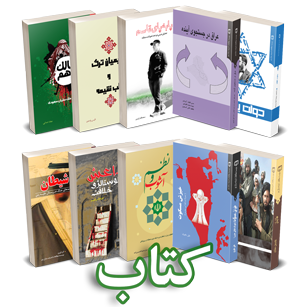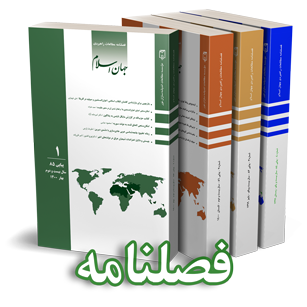گفتمانها و پادگفتمانهاي مقاومت
در سياست بينالملل
چکیده
گفتمان مقاومت تابعي از ضرورتهاي سياست بينالملل در دوران پس از جنگ سرد است. نظريهپردازان مختلف تلاش كردند گفتمان مقاومت در برابر «نظام سلطه» را با رهيافتهاي مختلف تبيين كنند.
در اين مقاله تلاش شده است نشانههاي گفتمان مقاومت براساس رهيافتهاي مختلف تنظيم و تبيين شود. از سوي ديگر ميتوان فرايندي را مورد ملاحظه قرار داد كه به موجب آن «پادگفتمان مقاومت» نيز از سوي كشورها و محافل نظريهپردازي جهان غرب توليد ميشود و گسترش مييابد. شايد بتوان بخش عمدهاي از اتاقهاي فكر كشورهاي سرمايهداري به ويژه امريكا را در زمره مجموعههايي دانست كه مبادرت به توليد پادگفتمان مقاومت ميكنند و از اين طريق زمينه لازم را براي برسازي و بازتوليد نظام سلطه فراهم ميآورند.
همچنين تلاش ميشود رهيافتهاي رقيب و متناظر به عنوان گفتمان و پادگفتمان مقاومت مورد بررسي تحليلي قرار گيرد. درك واقعي نظام سلطه صرفاً در شرايطي امكانپذير است كه بتوان رهيافتهاي مختلف مقاومت را تبيين كرد. طبعاً هر رهيافت ميتواند راهبردهاي مختلفي در راستاي شكلبنديهاي قدرت در نظام جهاني منعكس سازد. در كشورهاي جهان غرب و متحدين منطقهاي آنها نيز گفتمانهايي در روند مقابله با گفتمان مقاومت در حال شكلگيري است. محور اصلي چنين فرايندي را بايد توليد رهيافتهايي دانست كه ميتواند به عنوان بديل گفتمان مقاومت در مقابله با نظام سلطه به كار گرفته شود.
واژگان کلیدی
گفتمان مقاومت، هويت، پادگفتمان، نظام سلطه، جنبش ضد جهاني شدن
عنوان مقاله [English]
Discourses and anti -Discourses of Resistance
in International Policy
نویسنده [English]
Ebrahim Motagei, Ph.d
چکیده [English]
Abstract
Resistance discourse is function of the necessities of international politics in the aftermath of the Cold War. Different theorists tried to explain the resistance discourse against “domination system” by the different approaches. This paper is an attempt to explain the symptoms of resistance discourse based on various approaches. On the other hand, could consider other process whereby resistance anti-discourse “producing and spread by some theory circles and countries in the west. Perhaps the major part of thinks tanks in the capitalist countries, especially in the U.S., attempt to creation of resistance anti-discourse, and thus produce the necessary background for reproduction of the domination system.
This paper also examines competing approaches and corresponding as discourse and resistance anti- discourse. Real understanding of the system of domination is possible only in conditions that could explain different approaches of resistance. Naturally, every approach may reflect different strategies in line formations of power in the international system. In western countries and their local allies are emerged discourses In the process of dealing with discourse of resistance. The main core of such process should be production of approaches that can be considered as an alternative to the resistance discourse that be used against domination system.
واژگان کلیدی[English]
Keywords
Resistance Discourse, Identity, anti Discourse, Domination System, anti-Globalization Movement.
عنوان مقاله [العربية]
الخطابات و الخطابات المضادة للمقاومة
في السياسة الدولية
چکیده [العربية]
المخلص
يعتبر الخطاب المقاوم من روافد ضرورات السياسة الدولية في عهود ما بعد الحرب الباردة. و قد سعي المنظرون المختلفون ان يبيّنوا خطاب المقاومة امام النظام السطوي بالاتجاهات المختلفة. و قد اردنا في هذا المقال بيان تنظيم معالم الخطاب المقاوم بناءاً علي الإتجاهات المختلفة و من جانب أخر يمكن دراسة عملية تنتج و تتوسّع علي ايدي الدول و المجاميع المنظّرة في العالم الغربي. و من الممكن أن نعتبر قسماً هامّاً من المراكز البحثية في الأنظمة الرأسمالية خاصّة الولايات المتحدة من المنظومات التي تبادر الي انتاج الخطاب المقاوم المضادّ. و بهذا تتوفّر الارضية اللازمة لإعادة إنتاج النظام السلطوي. كما أنّه نريد الدراسة التحليلية للإتجاهات المتنافسة و المتناظرة كالخطاب و الخطاب المضادّ للمقاومة. إنّما يمكن الفهم الموضوعي للنظام السلطوي في ظروف يمكن فيها بيان الاتجاهات المختلفة للمقاومة. طبيعي أنّ كل إتّجاه قد يشير الي الإسترتيجيات المختلفة في اطار تشكيلة القوة في النظام العالمي. تتشكّل حاليا خطابات لمواجهة الخطاب المقاوم في الدول الغربية و حلفاءها الاقليمية. ينبغي ان نعتبر انتاج إتجاهات قد تستخدم كبديل لخطاب المقاوم في مواجهة النظام السلطوي كمحور اساس لعملية كهذه.
الكلمات المفتاحية
الخطاب المقاوم، الهوية، الخطاب المضاد، النظام السلطوي، الحركة ضد العولمة.
منابع فارسي
ـ باقری دولتآبادی، علی و قاسم منفرد (۱۳۸۸)، «ابعاد دیپلماسی تغییر بازی آمریکا در مواجهه با ایران»، فصلنامه جهان اسلام، س ۱۰، ش ۳۸٫
ـ بوزان، باری (۱۳۷۸)، مردم، دولتها و هراس، تهران: پژوهشکده مطالعات راهبردی.
ـ روزنا، جیمز (۱۳۸۰)، امنیت در جهان آشوبزده، ترجمه علیرضا طیب، تهران: مؤسسه ابرار معاصر.
ـ زيسر، ايال (۱۳۹۲)، «تهديدها و فرصتهاي بحران سوريه براي اسرائيل»، ترجمه عسگر قهرمانپور، فصلنامه مطالعات منطقهاي، س ۱۴، ش ۳٫
ـ سایکینگ، تام، «جهانی شدن ادیان خاص ـ خاص شدن ادیان»، ترجمة طاهره فیضی، ایران.
ـ شحاته، دنيا و مريم وحيد (۱۳۹۰)، «عوامل دگرگوني در جهان عرب»، فصلنامه مطالعات راهبردي جهان اسلام، س ۱۲، بهار.
ـ عطايي، محمد (۱۳۹۰)، «ايران و پيامدهاي بحران در سوريه»، سايت ديپلماسي ايراني.
ـ فريدمن، جورج (۱۳۹۱)، صد سال آينده؛ پيشبيني قرن ۲۱، ترجمه محمد زهدي گوهرپور و مريم دهقانآزاد، تهران: انتشارات زيتون سبز.
ـ كوهن، سائول (۱۳۸۷)، ژئوپليتيك نظام جهاني، ترجمه عباس كاردان، تهران: انتشارات ابرار معاصر.
ـ ليتل، ريچارد و مايكل اسميت (۱۳۸۹)، ديدگاههايي درباره سياست جهان، ترجمه عليرضا طيب، تهران: شركت انتشارات علمي و فرهنگي.
ـ لیک، دیوید و پاتریک مورگان (۱۳۸۱)، نظمهای منطقهای: امنیتسازی در جهانی نوین، ترجمه سیدجلال دهقانی، تهران: پژوهشکده مطالعات راهبردی.
ـ لینور.جی، مارتین (۱۳۸۳)، چهره جدید امنیت در خاورمیانه، ترجمه قدیر نصری، تهران: پژوهشکده مطالعات راهبردی.
ـ موسوي، حسين (۱۳۹۰)، «گذري بر مباني اجتماعي تحولات سوريه»، فصلنامه رهنامه سياستگذاري، س ۲، ش ۲، تابستان.
ـ نای، جوزف (۱۳۸۷)، قدرت نرم، ترجمه محسن روحانی و مهدی ذوالفقاری، تهران: انتشارات دانشگاه امام صادق.
ـ نای، جوزف اس. (۱۳۹۰)، آینده قدرت، ترجمه رضا مرادصحرایی، تهران: انتشارات حروفیه.
ـ والرشتاین، ایمانوئل، «آیندة نظام جهانی سرمایهداری در دورة پس از جنگ سرد»، ترجمة حمید احمدی، راهبرد، س ۳، ش ۱۳، ۱۳۷۶٫
ـ والرشتاین، ایمانوئل (۱۳۷۷)، «سیاست و فرهنگ در نظام متحول جهانی»، ترجمة پیروز ایزدی، راهبرد، س ۳، ش ۱۳،.
ـ ويليامز، پل.دي (۱۳۹۰)، درآمدي بر بررسيهاي امنيت، ترجمه عليرضا طيب، تهران: انتشارات اميركبير.
منابع لاتين
– AlJazeera (2011), “The Syrian Revolution: Possibilities for what lies Ahead”, Afro-Middle East Centre, May 11.
– Al-Khalidi, Suleiman and Simon Cameron – Moore (July 2011), “Syria Opposition Group form Council to Counter Assad”, Reuters, www.reuters.com
– Axelrod, Robert (1984), The Evolution of Cooperation, New York: Basic Books.
– Axelrod, Robert and Robert Keohane (1985), “Achieving Cooperation under Anarchy: Strategies and Institutions”, World Politics, No. 38.
– Badran, Tony (April 2011), “Who Are the Shabbiha? Weekly Standard Blog”, ww.w eeklystandard. com/blogs
– Bar, Shmuel (2006), “The Regime and Its Strategic Worldview”, Herzliya Conference, www. herzliyaconference.org
– Black, Ian (April 2011), “Six Syrians who Helped Bashar Al-Asad Keep Iron Grip after Father’s Death”, The Guardian, www.auardian.co.uk
– Buzan, Barry (2004), “The Roots of Muslim Age”, Atlantic Monthly, Vol. 22, No. 1.
– Darius Nazemroaya, Mahdi (2011), War with Syria, Iran and Lebanon in the Works?, Voltairenet.org, June 17.
– Garnett, John (2005), “Limited War”, in John Baylis et al, Contermporary Strategy: Theories and Policies. London: Croom Helm.
– George, Alexander and William E. Simons (1994), The Limits of Coercive Diplomacy, San Francisco: West View Press.
– George, Alexander L (1992), Forceful Persuasion, Coercive Diplomacy: As an Alternative to War, Washington D.C: United States Institute of Peace.
– Haass, Richard (2005), “Regime Change and its limits”, in http://www.foreignaffairs.org. http://thawra.alwehda.gov), http://www.treasury.gov.
– Harrod, J. (1992), Labour and Third World Debt, Brussels: International Federation of Chemical, Energy and General Workers’ Unions.
– Human Rights Watch (June 2011), www.hrw.org
– Kifner, John (February 1982), “Syria Said to Raze Part of Rebel City”, New York Times.
– Macleod, Hugh (April 2011), “Inside Deraa”, Al Jazeera, http://english.aljazeera.net
– Marx, Daniel (2011), “Syria: A Turning Point for the Arab Spring?“, In Observatorio Electoral, May 18.
– “Numair al-Asad Is Stealing the Syrians”, December 2006, You Tube, www.youtube.com
– OECD (1996), Financial Market Trends 63, Paris: Organization for Economic Cooperation and Development, February.
– Oweis, Khaled Yakoub (July 2011), “۳۲ Killed in Syria Protests, Damascus Moves: Activists”, Reuters, www.reuters.com.
– Price, R. (1998), “Reversing the Gun Sights: Transnational Civil Society Targets Land Mines”, International Organization, Vol. 52, No. 3, Summer.
– Roberts, S. M. (1995), “Small Place, Big Money: The Cayman Islands and the International Financial System”, Economic Geography, Vol. 71, No. 3.
– Reynolds, Dean (2011), “Syria unrest Presents Dilemma for Iran”, in CBS News, March 25.
– Ruggie, J. G. (1993), “Territoriality and Beyond: Problematizing Modernity in International Relations”, International Organization, Vol. 47, No. 1, Winter.
– Shadid, Anthony (2011), “Syrian Elite to Fight Protests to the End”, New York Times, May 10.
– Sly, Liz (July 2011), “Sectarian Violence in Syria Raises Fears”, Washington Post.
– Sullivan, S. (1997), From War to Wealth: Fifty Years of Innovation. Paris: Organisation of Economic Cooperation and Development.
– Tabler, Andrew (2011), “The Degrading of Syria’s Regime”, Council on Foreign Relations, June 14.
– Tenet, George (2000), “Assymetrical Threat After Cold War“, Washington D.C: Central Intelligence Agency Press.
– Van Dam, Nikolaos (1996), The Struggle for Power in Syria: Politics and Society under Asad and the Ba’th Party, New York: I.B.Tauris.
– Walt, Stephen (1991), “Alliance Formation in Southwest Asia: Balancing and Bandwagoning in Cold War Competition”, in Robert Jervis and Jack Snyder (eds), Dominoes and Bandwagons, New York: Oxford University Press.
– Weiss, Michael and Hannah Stuart (2011), “The Syrian Opposition: Political Analysis with Original”, Foreign Policy, May 04.
– Wiener, J. (1999) Globalization and the Harmonization of Law, London: Pinter.
– William, P. (1994) “Transnational Criminal Organization and International Security”, Survival, Vol. 36. No. 1, Spring.
– Yadlin, Amos and Robert Satloff (2011), “Syria: The Case for ‘The Devil We Don’t Know“, The Washington Institute for Near East Policy, May 19.
Yvonne, Haddad (1996), Islamist Perceptions of U.S Policy in the Middle East, Boulder Co: West View Press.





